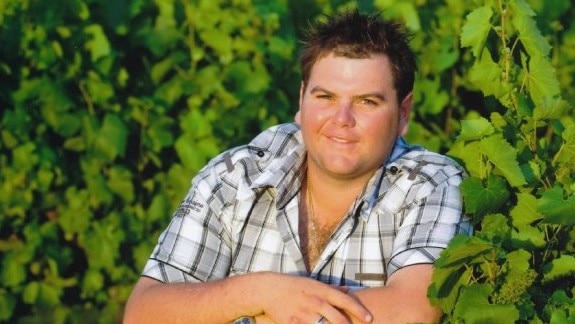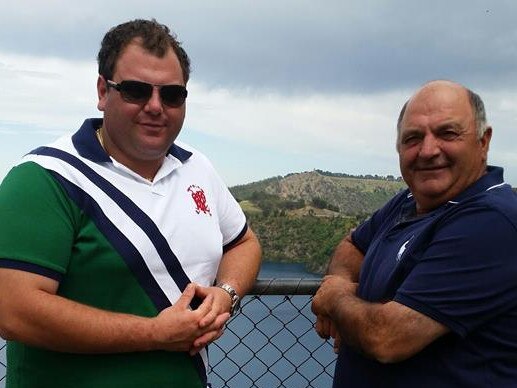Cut adrift and failed by the system: Theo Papageorgiou’s parents hope his tragic death will lead to real change
Theo went to his local hospital five times for help with depression. Undiagnosed, he was repeatedly sent home. His tragic suicide lays bare the utter failings within SA’s health system.
SA News
Don't miss out on the headlines from SA News. Followed categories will be added to My News.
Theo Papageorgiou was asked many questions about his mental health in the last weeks of his life but his parents feel that they were the only ones listening to the answers.
The 27-year-old vigneron had plunged into a deep depression which went undiagnosed and incorrectly treated as a result of failings in the Riverland mental health system.
A damning inquest into the handling of Theo’s case found that despite attending hospital twice in January 2016 seeking to be admitted under the Mental Health Act, he “received no meaningful assistance”.
On both occasions doctors failed to see the warning signs and Theo was sent home with an appointment to see a psychiatrist in the following weeks.
But Theo did not have weeks and on January 24, 2016, his life was cut short.
The inquest into his death uncovered multiple failings in the mental health system in the Riverland, which Deputy Coroner Anthony Schapel wrote could extend to other country areas.

Theo’s parents Jack and Poppy Papageorgiou are demanding change in the country mental health system, which they believe could have saved their son’s life.
“We believe this should never have happened and that our son was failed and we know that it must never happen again,” Jack Papageorgiou said.
“Someone needs to tell me and my wife: who takes responsibility for Theo.
“The system should have been better than what it was for our son.”
The parents are calling for a review of mental health systems in the Riverland in particular, but also in the wider country areas.
“It is not right that even to this day a GP wanting information out-of-hours will have to go to the Riverland Hospital and sit on a computer to get it,” Mr Papageorgiou said.
Mrs Papageorgiou said it was difficult to see how the education and police computer systems could be so centralised, while different health organisations had little to no information sharing.

Big dreams
Theo’s parents said their son always had big dreams. From a young age he wanted to own his own vineyard, following in the footsteps of his family.
In his early 20s, through sheer hard work, Theo purchased his own vineyard and was in demand on other properties to help during the busiest parts of the year.
He was a popular man and widely known through the Riverland.
At his funeral in 2016 more than 1000 people made their way to the Riverland to remember Theo.
In November 2014, Theo’s mental health had begun to decline. He told his parents he was feeling depressed and not himself.
He was taken to the Riverland General Hospital and then referred to a local GP who, several months later, placed him on anti-psychotic medication.
Mr Papageorgiou said one of the side effects of the medication was possible suicidal thoughts, an aspect of the treatment the family believes was not properly addressed in the months which followed.
Detained
On November 23, 2015, Theo was placed on an inpatient treatment order at the Riverland General Hospital, which would allow them to keep him detained under the Mental Health Act for seven days.
The inquest found Theo was “floridly psychotic” and had delusional thoughts.
His parents stayed at his side, including overnight stays by his mother.
Theo’s care was taken over by another psychiatrist, Dr Sareth Attanayake, who the inquest found to have been “overwhelmed” by work.
The inquest found Theo was misdiagnosed as having had a “first-episode psychosis”. The record of the November 2014 GP visit was not obtained.
The Riverland Hospital did not, and still does not, have a closed ward capable of keeping Theo detained.
Rather than move him to Adelaide to a closed ward, after six days Theo was sent home.
An independent psychiatrist who reviewed Theo’s case later said it would have been a “miracle” that he had recovered in that time and likely left the hospital “clearly, and profoundly, mentally unwell”.
An ‘astonishing’ failure
On January 14, 2016, Theo’s manic episodes had passed and, as is common with bipolar, he was in the grips of a severe depression.
He started apologising for events from years past and said he “did not like the thoughts he was having”.
His parents took him to the hospital.
The inquest heard that the ED was a privately run service operated by local GPs, while the mental health ward was operated by the state.
Because of the divide, Theo’s initial consultation notes, which included that he could not control his racing thoughts, were not passed on to the mental health team.
“That would, if true, appear to be an astonishing state of affairs especially where both the ED and the mental health team were under the same roof,” Mr Schapel said in his findings.
Theo was not placed on an inpatient order and sent home with his parents.
Three days later the family again returned to hospital after the parents woke in the early hours of the morning and found Theo distraught with his head pressed against the wall.
They expected Theo to be admitted and packed an overnight bag for him but once again were told to take him home.
“We shouldn’t have to go to extreme lengths to try and get doctors to take us seriously,” Mr Papageorgiou said.
“It was as though they thought that because we were there to support Theo that they could send him home.”
The next morning Theo was found dead by his father.
A ‘preventable’ tragedy
In his findings, Mr Schapel found Theo’s death was preventable.
During the inquest, the clinical director of Country Health SA, Dr Brian McKenny, also agreed what happened to Theo could have been avoided.
Mr Schapel noted systemic failures in dealing with Theo and his parents including that he had been misdiagnosed and there was no communication between the various services in the Riverland.
The inquest heard that funding issues affecting country mental health services remain more than five years after Theo’s death.
Crucially, Mr Schapel found that Theo had fallen victim to a culture of passing responsibility.
“Clinicians refrained from dealing with the situation at hand because Theo was due to be seen by others,” he concluded.
A specialist report prepared by labelled the mindset “treatment by appointment”.
Counsel assisting the Coroner, Stephen Plummer summed up the situation in his closing address.
“The moment Theo left that hospital, he and his family were essentially cut adrift,” he said.
“They were left to desperately scramble from emergency department, to GP, to nurse, to psychologist.
“None of whom were properly talking to one another and with no one to provide oversight or continuity of care.”
SA Health said in a statement on Monday, “we are reviewing the Coroner’s findings handed down recently and are considering the recommendation in detail.”




